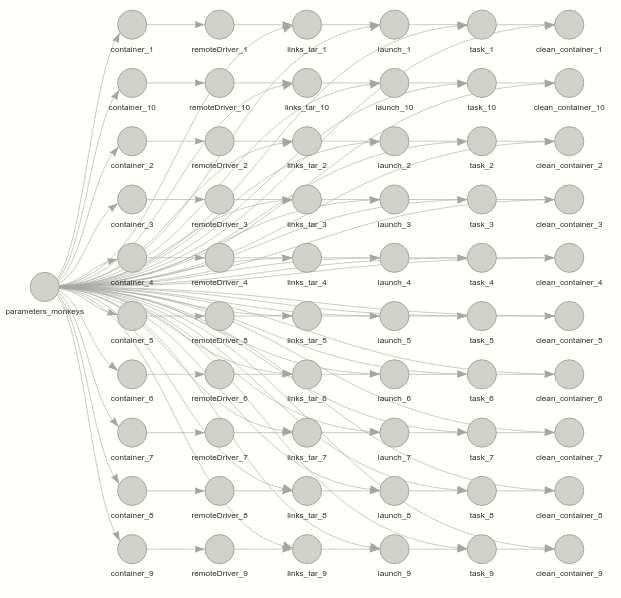jsPsychMonkeys::release_the_monkeys(uid = 1,
local_folder_tasks = "~/Downloads/protocol999/")4 jsPsychMonkeys
jsPsychMonkeys: Release Monkeys to a jsPsych experiment using the R package {targets}, docker and {RSelenium}.
See QuickGuide for basic instructions.
Setup
First, install Docker Desktop.
You may need to install some system libraries first:
sudo apt install libssl-dev libcurl4-openssl-dev libxml2-dev docker
- If the Monkeys do their work but no csv’s appear, make sure your the docker user has write access to the
~/Downloadsfolder.
In some versions of Ubuntu, you do not need to install docker. If anything fails, installing Docker desktop could help. Alternatively, maybe you need docker as non-root user?, but be careful, as this leaves your system more vulnerable.
- Install docker desktop
- Update wsl (in a command prompt):
wsl - update
- Install docker desktop
4.1 How to simulate participants
If you are on Windows, make sure Docker Desktop is open and running before releasing the monkeys.
To run a monkey locally:
To run a monkey on a server:
jsPsychMonkeys::release_the_monkeys(uid = 1,
server_folder_tasks = "999",
credentials_folder = "~/.vault/")credentials_folder must contain SERVER_PATH.R and .credentials. See below for the expected content of those files.
4.2 Parameters available
There are a few parameters for jsPsychMonkeys::release_the_monkeys() that can be useful:
uid_URL = TRUE: The uid is passed in the URL (e.g.&uid=1)local_folder_tasks = rep("Downloads/tests/test_prototol", 25): Passing a vector of multiple protocols will make the Monkeys to complete all of them.times_repeat_protocol: How many times a monkey should complete the same protocol (useful for longitudinal protocols or to speed up things)time_to_sleep_before_repeating_protocol: How many seconds to wait before reattempting to complete the protocolkeep_alive = TRUEKeep the docker container alive after completing the tasksDEBUG = TRUEActivate DEBUG mode. Lot’s of stuff will show up in the console.open_VNC = TRUEActivate DEBUG mode and open a VNC container to see the Monkeys’ progress.screenshot = TRUEThe Monkeys will take a picture of all the pages they see. The .png files are stored inoutputs/screenshotsdebug_file = TRUEActivate DEBUG mode and store all the console output in theoutputs/logbig_container = TRUESets the Shared memory size (/dev/shm) to 2 gigabytes. This is useful to avoid long/complex protocols to crashdisable_web_security = TRUEIf you are running a local protocol that loads external files (e.g. consent form in a html file), you may need this. Only works with Google Chrome.console_logs = TRUEStore the browser’s console logs. Only works with Google Chromeforced_random_wait = TRUEWill wait a randomly sampled number of seconds on page 4forced_seed = 11Set a random seed so the Monkeys’ behavior will be fully reproducibleforced_refresh = 20Refresh browser in page 20 (if TRUE is given, it will refresh in a randomly sampled page)sequential_parallelChoose betweensequential, the default, orparallelnumber_of_coresNumber of cores for parallel monkeys. The default is half of the available cores
4.2.1 Parameters details
local_folder_tasks: If the folder is not accessible to Docker (anything outside the Download folder), jsPsychMonkeys will create a copy of the protocol inDownloads/JSPSYCH/
4.3 Release a horde of Monkeys!
If you want a horde of Monkeys, you can set up sequential_parallel = "parallel" and choose how many monkeys will run in parallel with number_of_cores:
jsPsychMonkeys::release_the_monkeys(uid = "1",
local_folder_tasks = "~/Downloads/protocol999/",
sequential_parallel = "parallel",
number_of_cores = 4) 10 Monkeys completing a protocol in parallel:

4.4 Issues
If the setup configuration steps didn’t work… You may need to do one of the things below:
Switch to Ubuntu :-)
Run participants manually
4.5 Technical aspects
4.5.1 Launch Monkeys on a server
You will need two files for the configuration in the hidden and NOT SHARED .vault/ folder:
.vault/SERVER_PATH.R: contains the path where the protocols are located in your server:server_path = "http://URL_OF_YOUR_SERVER/PROTOCOLS_GENERAL_FOLDER/".vault/.credentials: contains a list with the user and password for the server:
list(IP = "IP ADDRESS OF SERVER",
main_FOLDER = "/MAIN/FOLDER/AND/PATH/TO/FILES/IN/THE/SERVER/",
user = "YOUR SERVER USERNAME",
password = "YOUR VERY STRONG SERVER PASSWORD")With the server_folder_tasks you will set the sub-folder where the protocol is located. In the example below the Monkeys would go to, http://URL_OF_YOUR_SERVER/PROTOCOLS_GENERAL_FOLDER/999
4.5.2 Alternatives
Since jsPsych 7.1 there is a simulation mode available, which should be much faster than the good ol’ Monkeys. Once we migrate to jsPSych 7.x, we may retire this section.